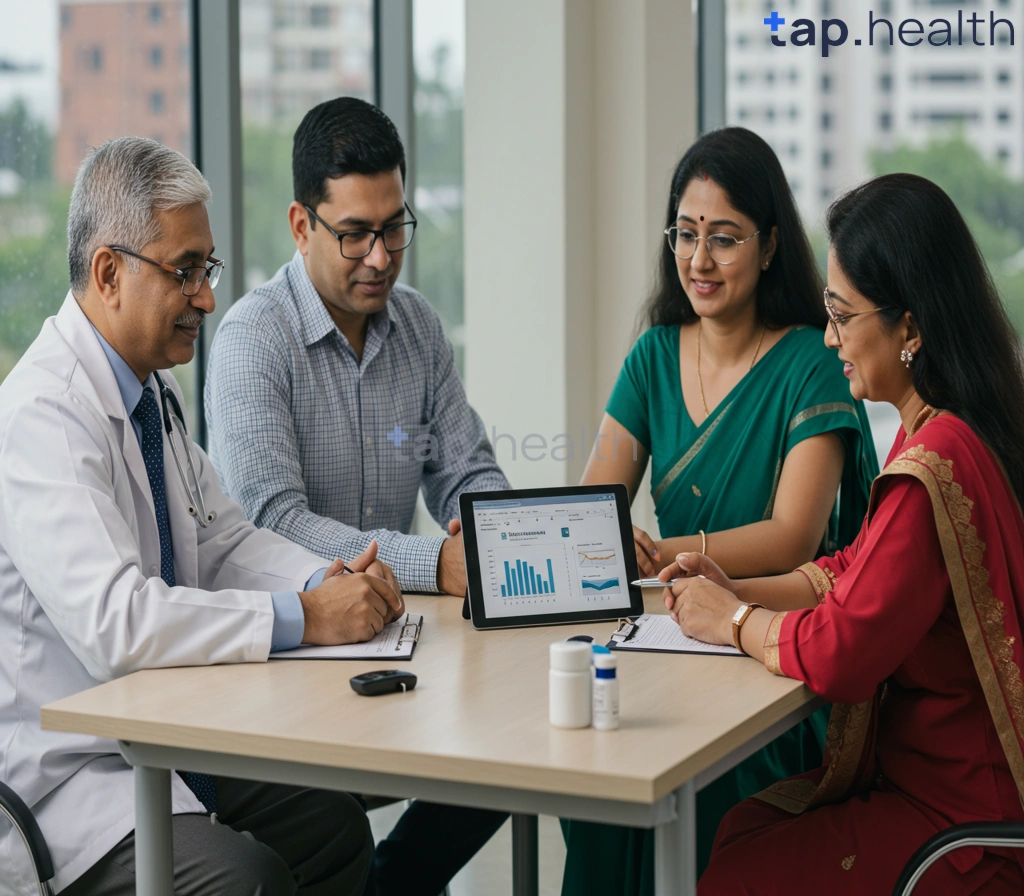Table of Contents
- Building a New Onset Hyperglycemia Cohort: Study Design
- Understanding NOD: A Prospective Cohort Study
- New Onset Diabetes Cohort: Methods and Outcomes
- Following NOD Progression: A Longitudinal Study Approach
- Key Factors in Establishing a Successful NOD Cohort
- Frequently Asked Questions
- References
Have you ever wondered about the complex journey of newly diagnosed individuals with hyperglycemia and diabetes? Understanding the early stages of this condition is crucial for effective management and improved patient outcomes. That’s why we’re excited to share details about a groundbreaking study: Establishing a New Onset Hyperglycemia and Diabetes (NOD) Cohort: A Prospective Study. This blog post will delve into the purpose, methods, and anticipated impact of this important research initiative, offering insights into the challenges and opportunities in managing NOD. We’ll explore how this prospective study will contribute to a better understanding of disease progression and ultimately lead to improved care for those affected.
Building a New Onset Hyperglycemia Cohort: Study Design
The alarming rise in youth-onset diabetes, particularly in urban Indian areas, demands immediate attention. Studies show a concerning 4% annual increase, highlighting the urgent need for robust research and effective intervention strategies across India and other tropical countries. This prospective study focuses on establishing a New Onset Hyperglycemia and Diabetes (NOD) cohort to better understand the etiology and progression of this increasingly prevalent condition.
Cohort Selection and Inclusion Criteria
Our study will meticulously select participants exhibiting new-onset hyperglycemia, focusing on specific age groups and demographic factors relevant to the Indian context. This will involve rigorous screening to identify individuals with recently diagnosed hyperglycemia and diabetes, accounting for variations in presentation across different populations within India and similar tropical regions. We will also consider factors such as socioeconomic status, lifestyle, and dietary habits to gain a comprehensive understanding of the contributing factors. Understanding the impact of lifestyle choices is crucial, and for more information on how to build healthy habits, you can check out our blog on How to Build Habits That Help Control Blood Sugar Levels.
Data Collection and Analysis
The cohort will undergo comprehensive data collection, including detailed medical history, anthropometric measurements, lifestyle assessments, and advanced metabolic testing. This robust approach will ensure accurate and reliable data, allowing us to identify trends and risk factors specific to the Indian subcontinent and other tropical nations. Sophisticated statistical analysis techniques will be employed to analyze the data and draw meaningful conclusions. The long-term aim is to develop region-specific preventative measures and treatment strategies. Dietary strategies, such as those explored in Meal Timing & Intermittent Fasting for Glycemic Stability, may play a significant role in these preventative measures.
Call to Action
Researchers, healthcare professionals, and institutions in India and across tropical regions are encouraged to collaborate and participate in this critical research endeavor. Your expertise and resources are invaluable in combating the escalating diabetes epidemic and improving the lives of those affected. By joining this study, we can collectively work towards a healthier future for our communities.
Understanding NOD: A Prospective Cohort Study
Diabetes, a growing concern across India and tropical countries, presents significant challenges. One crucial area requiring further investigation is New Onset Hyperglycemia and Diabetes (NOD). This prospective cohort study aims to deepen our understanding of NOD’s prevalence, progression, and associated complications, particularly in these high-risk regions. The study will provide invaluable data to inform targeted prevention and management strategies.
Focus on Complications in Tropical Climates
A key focus will be the impact of NOD on prevalent complications like diabetic neuropathy. This debilitating condition affects 30-50% of diabetic patients, causing significant pain and reduced mobility, impacting quality of life. The study will analyze the unique challenges posed by tropical climates on the onset and management of NOD and its associated complications, including the influence of heat, humidity and infectious diseases. This is particularly important given the high prevalence of diabetes in India and other tropical nations. While this study focuses on NOD, understanding conditions like PCOD can also offer valuable insights into hormonal imbalances that may contribute to diabetes development.
Actionable Insights for Healthcare Professionals
Understanding NOD’s characteristics in these specific regions is crucial for tailoring effective interventions. The findings from this study will be instrumental in developing culturally appropriate educational programs, improving early detection methods, and optimizing treatment strategies specific to the needs of individuals living with NOD in India and other tropical countries. This research will equip healthcare professionals with the knowledge needed to proactively address the rising burden of diabetes and improve patient outcomes. For a better understanding of related hormonal conditions, we recommend reading more about What Happens in PCOD: Every Woman Needs to Know, as it highlights the complexities of hormonal health.
Participate and Contribute
We encourage healthcare professionals across India and other tropical countries to actively participate in this vital study. Your collaboration will help to significantly improve the lives of those affected by NOD and contribute to the development of impactful, region-specific diabetes care. Join us in this crucial endeavor to tackle the diabetes epidemic in these vulnerable communities.
New Onset Diabetes Cohort: Methods and Outcomes
Understanding the Indian Context of Early-Onset Diabetes
India faces a significant challenge with the alarmingly high number of early-onset diabetes (EOD) cases, often manifesting between ages 25 and 40. This necessitates robust research focusing on New Onset Hyperglycemia and Diabetes (NOD) in this specific demographic. Our prospective study aims to address this critical gap by establishing a comprehensive NOD cohort within the Indian context, and potentially extending learnings to other tropical countries facing similar epidemiological challenges. We will analyze factors contributing to this phenomenon, going beyond established risk factors to incorporate region-specific lifestyle and environmental influences.
Methodology and Data Collection
The study will employ a rigorous methodology, encompassing detailed patient profiling, comprehensive medical assessments, and long-term follow-up. Data collection will include genetic predispositions, lifestyle factors (diet, physical activity), socioeconomic status, and environmental exposures. Careful attention will be given to capturing nuances specific to the Indian population, including dietary habits and access to healthcare. This granular approach will provide a rich dataset for exploring the multifaceted nature of NOD in high-risk populations. Improving diabetes lifestyle management is crucial, and you can learn more about How Can New Technological Advances Improve Diabetes Lifestyle?.
Expected Outcomes and Impact
We anticipate this research will yield valuable insights into the pathogenesis of NOD in India and similar regions. The findings will contribute significantly to the development of targeted prevention strategies and improved management protocols for early-onset diabetes. Furthermore, the creation of this comprehensive cohort will serve as a crucial resource for future research, facilitating collaborative efforts to combat the escalating prevalence of this debilitating disease. We hope our research will contribute to the creation of effective interventions and improved public health outcomes in India and other tropical regions. This is a vital step in addressing a public health crisis demanding urgent attention. Understanding the challenges associated with Managing Diabetes as You Age: Challenges and Solutions will also inform our long-term strategies.
Following NOD Progression: A Longitudinal Study Approach
Understanding the Need for Longitudinal Studies in NOD
Individuals in India and other tropical countries face a disproportionately high burden of type 2 diabetes (T2D). A significant portion of this burden stems from the progression of new-onset hyperglycemia and diabetes (NOD). Understanding this progression is crucial for effective prevention and management strategies. Research indicates that individuals with prediabetes have a 5-10% annual risk of developing T2D (learn more). This highlights the urgent need for longitudinal studies, like the one proposed, to track NOD development and identify crucial risk factors specific to these populations. A prospective cohort study offers a valuable approach to observe this progression over time.
The Importance of a Prospective Cohort in India and Tropical Regions
This prospective study design allows for the careful observation of NOD progression in a defined population. By following participants over several years, researchers can meticulously document the onset of hyperglycemia, track the transition to T2D, and evaluate the influence of various lifestyle, genetic, and environmental factors prevalent in the Indian subcontinent and tropical climates. This approach is especially vital given the unique challenges and risk factors associated with diabetes in these regions. Factors such as dietary habits, physical activity levels, and access to healthcare differ significantly, impacting disease progression. Understanding the link between diabetes and other conditions, such as Peripheral Artery Disease (PAD), is also crucial for comprehensive management.
Actionable Steps and Future Implications
The data collected from this longitudinal study will be invaluable in developing targeted interventions and preventative measures specific to the Indian and tropical contexts. By identifying early warning signs and high-risk individuals, effective strategies can be implemented to delay or prevent the onset of T2D. This research has the potential to significantly improve diabetes care and public health initiatives in these regions, leading to a reduction in the prevalence of this chronic disease and its associated complications. Participation in this study is crucial for advancing our understanding of NOD and improving the lives of millions.
Key Factors in Establishing a Successful NOD Cohort
Establishing a robust New Onset Hyperglycemia and Diabetes (NOD) cohort in Indian and tropical countries requires careful consideration of several key factors. The high prevalence of type 2 diabetes in these regions, coupled with the fact that up to 80% of cases can be delayed or prevented through lifestyle changes (lifestyle changes), necessitates a proactive approach. Successful cohort establishment hinges on recruitment strategies that account for unique cultural and socioeconomic factors.
Recruitment Strategies and Participant Engagement
Effective recruitment requires reaching diverse populations. This includes leveraging community health workers, local partnerships with healthcare providers, and culturally sensitive communication strategies. Addressing potential barriers like limited health literacy and transportation difficulties is crucial for ensuring diverse representation within the cohort. Engaging participants effectively involves clear communication about study aims, benefits, and procedures in local languages, with transparent informed consent processes. Regular follow-up and culturally appropriate incentives can improve retention rates. Careful consideration of Nutrient Density in Diabetic Meal Plans: Prioritizing Quality Foods can also be vital in participant engagement and retention, especially when discussing lifestyle modifications.
Data Collection and Management
The success of the NOD cohort also depends on comprehensive and standardized data collection. This requires robust protocols for measuring key clinical variables, lifestyle factors (diet, physical activity), and relevant biomarkers. Data management systems must be secure and efficient, with built-in quality control measures to minimize errors and ensure data integrity. Considering the tropical climate and potential environmental influences on diabetes development, incorporating relevant environmental data into the study design will enrich the insights.
Long-Term Sustainability and Collaboration
Securing long-term funding and building strong collaborations with local institutions are essential for the continued success of the cohort. Collaboration with researchers, clinicians, and community organizations enhances the reach and impact of the study, allowing for the generation of valuable insights applicable to the specific needs of the Indian and tropical populations. Developing sustainable infrastructure for data collection and analysis is also vital for long-term success. This ensures the cohort remains a valuable resource for future research and improved diabetes care in these regions. The principles of successful cohort establishment discussed here can also be applied to other areas of health research, such as the strategies outlined in What to Do After Embryo Transfer to Increase Success.
Frequently Asked Questions on Hyperglycemia and Diabetes (NOD) Cohort
Q1. What is the main goal of this study?
This prospective study aims to create a New Onset Hyperglycemia and Diabetes (NOD) cohort to understand the causes and progression of diabetes, particularly in India and other tropical countries, and develop region-specific prevention and treatment strategies.
Q2. Why is this study focusing on India and tropical regions?
These regions are experiencing an alarming rise in youth-onset diabetes, with studies showing a concerning 4% annual increase. The study will analyze factors specific to these regions, such as climate, lifestyle, and socioeconomic factors, to develop tailored interventions.
Q3. What data will be collected, and how will it be used?
The study will collect detailed medical history, anthropometric measurements, lifestyle assessments, and advanced metabolic testing. Sophisticated statistical analysis will identify trends and risk factors to inform the development of region-specific preventative measures and treatment strategies.
Q4. How can healthcare professionals and researchers participate?
Researchers, healthcare professionals, and institutions in India and other tropical regions are encouraged to collaborate. Their expertise and resources are crucial for combating the escalating diabetes epidemic and improving the lives of those affected.
Q5. What are the potential benefits of this research?
This research will provide invaluable data to improve early detection methods, optimize treatment strategies, and develop culturally appropriate educational programs for individuals with NOD in India and other tropical countries. The ultimate goal is to reduce the burden of diabetes and improve patient outcomes.
References
- Electronic Health Records-Based Data-Driven Diabetes Knowledge Unveiling and Risk Prognosis : https://arxiv.org/pdf/2412.03961
- Exploring Long-Term Prediction of Type 2 Diabetes Microvascular Complications: https://arxiv.org/pdf/2412.01331





